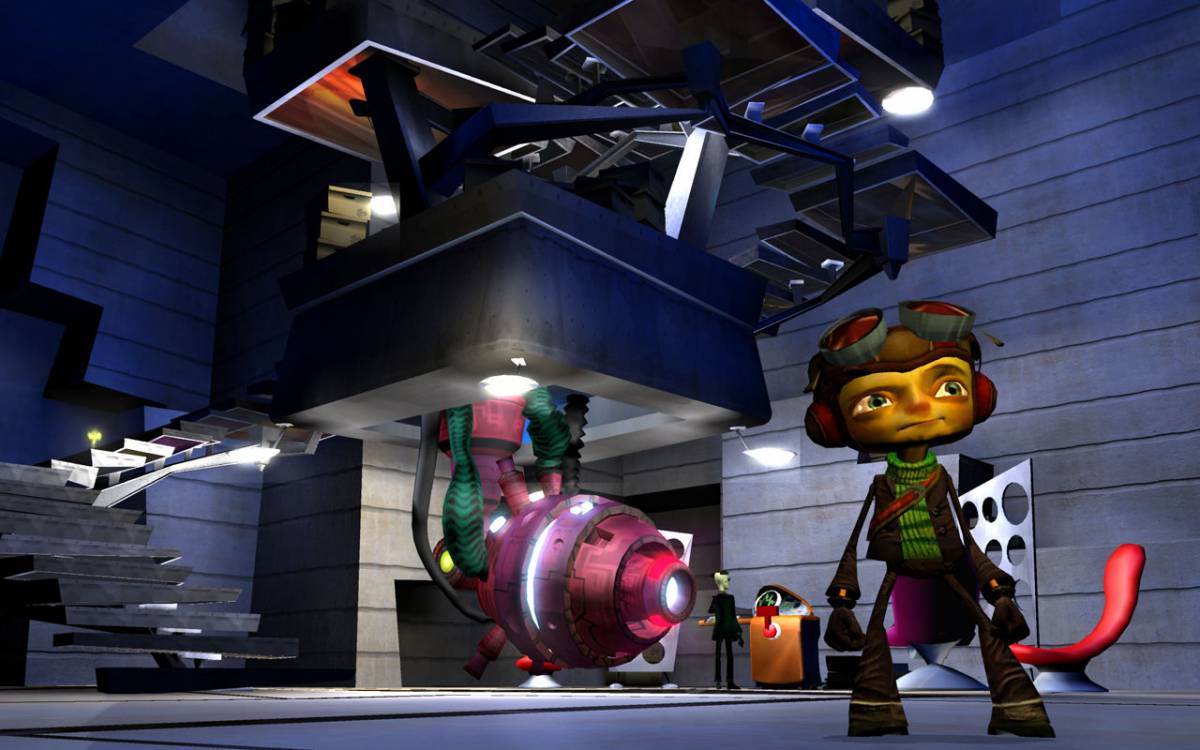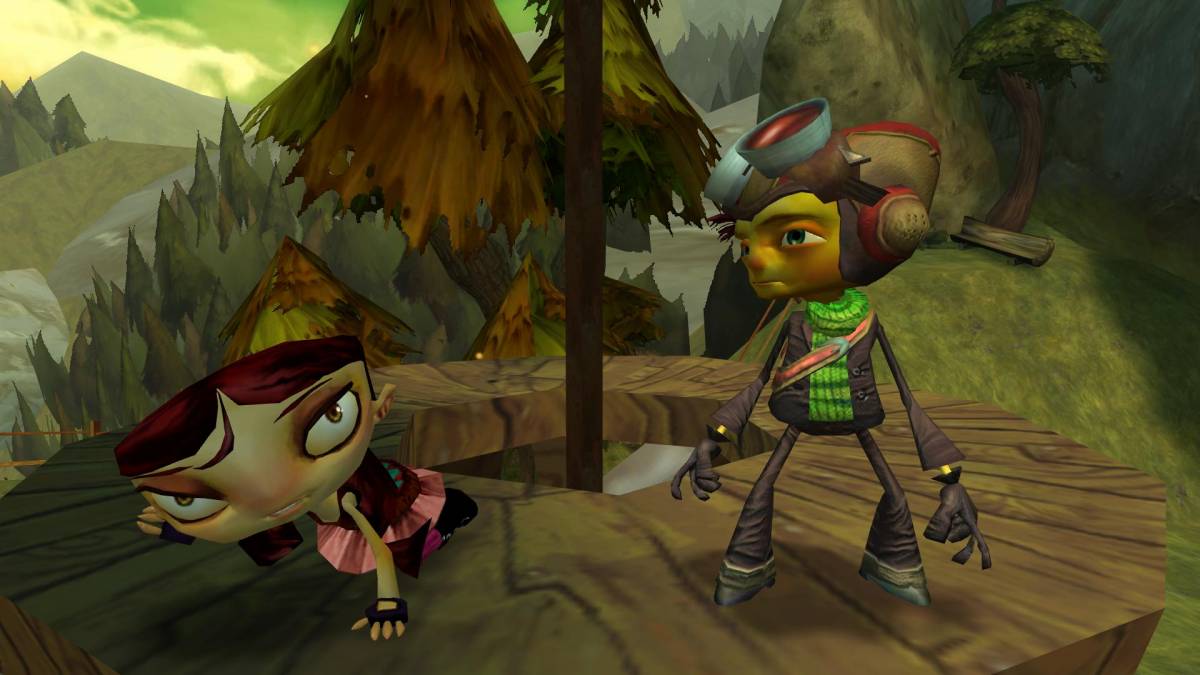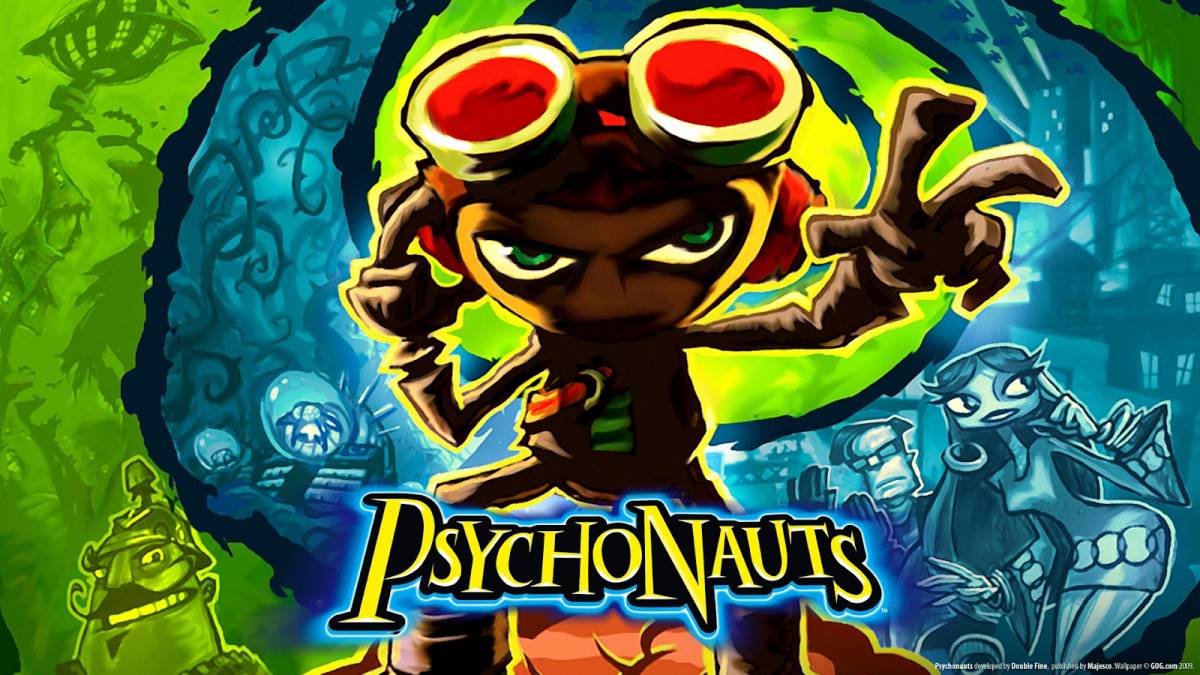Creating a game that has a signature style is a hard thing to accomplish; companies want ‘that’ quality that will allow their product to stand out, but most are wary of getting it wrong, producing something that is hard to understand or unappealing.
A cogent example of a hard sell, on first glance, is Psychonauts. It has a quirky art style, the main characters all have oddly shaped facial features, the game mechanics are vast and unique and its name doesn’t really convey how the game will play, so it isn’t surprising that it didn’t sell particularly well during its original release. Thankfully, though, Psychonauts has since gone on to sell over 1.7 million copies and it is thanks to its inclusion in various Humblebundles and its presence on Steam and GOG that a generation of gamers who originally overlooked it have had a chance to play a forgotten classic.
Psychonauts is a great game. No, great would be underselling it; Psychonauts is nothing short of a masterpiece.
Flawed in a couple of areas, maybe. But still a masterpiece filled with unique ideas that come together to form a cohesive, well-developed experience that will put a smile on even the most stoic gamer’s face. However, this should come as no surprise to anyone who has previously played a Tim Schafer game, a back-catalogue that includes Grim Fandango and Full Throttle. Both of which have the same dark sense of humour and well written story which runs through the veins of Psychonauts.
Even from the first FMV, the game wastes no time in injecting large doses of humour into the story, opening with a video sequence that shows a group of campers ‘Psycadets’ who are listening to a ridiculous yet somehow inspiring monologue about the “mental battlefield” and how Psychonauts enter the minds of others to fight the mental manifestations of fears. Unfortunately, this speech is interrupted by Raz, the protagonist, who has fled from the circus to join the Psychonauts. Weird enough yet? Well, during this twelve hour adventure, Raz encounters a boy who blows up brains, psychic secret agents, a military obsessed camp leader who wasn’t allowed to join the army and is traumatised by meat, a 30 foot lungfish, and a dentist who pulls out brains just to name a few.
It is these characters and their oddities that make Psychonauts a personable, endearing tale. This isn’t to detract from anything else in the game, but I often found myself with sympathy for the villains, or how Dogen, a young boy who is forced to wear a tinfoil hat, had a Ralph-esque slowness about him but wasn’t presented as an idiot. Not once did a character come across as one dimensional and each one had their own motivations and emotional baggage.
Half of the reason why these characters came effectively to life was due to the wonderful voice acting. In fact, the voice acting within this game is good enough that it could go toe-to-toe with any animated cartoon or film. Each and every voice matched the character’s design and personality perfectly. Bobby Zilch, the camp bully, is a tall, goofy looking kid who has an irritating squeaky voice. Dr Loboto, the mad dentist, has an upper class British accent and delivers his lines theatrically. Fred Bonaparte, nephew of Napoleon Bonaparte, has a nasally French accent and conveys a naturally lackadaisical attitude.
The other half is the the artstyle. Scott Campbell has done one hell of a job here. The whole thing sort of looks like a weird mish-mash of Invader Zim and stop animation. Tim Schafer wanted a visually unique game and had a lot of input in the character designs and it shows. Each character has large, exaggerated facial features and sort of look like they are made from clay: Mia Vodello, a secret agent ‘mental minx’, conveys undertones of sultriness whilst looking friendly and approachable; Dr Loboto, one of the main villain, wears a stylised straightjacket, a weird flowery bag as a hat, a claw for a hand and has a maniacal smile plastered on his face.

Every level is gorgeous, unique and memorable. It would be hard to pick one that stands out as each stage is as good as the last. Milla’s Dance Party uses bright and gaudy colours in a psychedelic, 70’s inspired dance hall, Waterloo World takes place on a giant hex grid that sort of resembles The Settlers of Catan, Black Velvetopia uses fluorescent colours, lots of blacks, reds and purples and, unsurprisingly, velvety textures. The Milkman Conspiracy, as i mentioned earlier, is a large warped, suburban neighbourhood.
The soundtrack, like the game itself, is weird, bombastic, exaggerated, and oozing character. During the start of the game, slower guitar rifts play out whilst in the safe environment of the camp, but as soon as Raz embarks on his adventure and enters a mind, the audio comes into its own. Triangles, clarinets, saxaphones, piano, maraccas, bongos, it has it all. The soundtrack is a smorgasbord of genres, yet somehow it works. As a soundtrack, it is incohesive, but the schizophrenic audio is intrinsically linked to the game itself. Raz enters into the minds of others and each mind is unique, so it was always going to fail as a cohesive whole. However, If each track is evaluated on its own merits and in the context of when it is used, it is fantastically insane.
Whilst traversing through these ‘mental worlds’ and navigating his way around Whispering Rock camp, the crux of the gameplay involves platforming and problem solving. Raz can jump, punch, climb and use an array of ‘PSI Powers’. Telekinesis, for instance, allows objects to be picked up and thrown, pyrokinesis immolates targets in flames, and other abilities such as shield, confusion, levitation and invisibility can be used to avoid incoming attacks. Another ability, clairvoyance, a power that enables Raz to see through another person’s eyes, can even be used when it serves little to no purpose, allowing the player to see how they perceive Raz.
Using these PSI Powers and finding ways to combine them into a deadly attack is hugely rewarding. Enjoy using a shield to block attacks and then countering, you can do it. Prefer sneaking behind enemies by using invisibility or throwing objects from a distance, these are possibilities, too. Even better, all of these powers can be enhanced through the use of collectibles, providing sizeable upgrades that can quickly turn the tide of battle. The endless variety and upgrades provides a huge amount of depth, but, understandably, some may be put off as these upgrades require large amounts of ‘PSI energy’ to be collected and may become cumbersome for those who aren’t completionists or enjoy collectathons.

However, fighting enemies is only a small part of the experience as the lion’s share of the gameplay focuses on platforming and puzzle solving; the former plays a large role in every mission as Raz jumps, climbs and swings across various platforms and surfaces to cross the expansive and often perilous environments, but the latter can feature heavily or lightly depending on the stage. Items, psychic abilities and interacting with environments are all tools which Raz will regularly use to solve puzzles and more complex platforming elements, enabling obstacles to be potentially tackled in hundreds of ways. In Waterloo Land, telekinesis plays a central role as Raz uses his mind to mentally move militia pieces across a hex board. Other levels involve remembering which items to use in a certain order, require levitation to float between platforms, using a shield to block an incoming attack, or shooting far off targets using psychic energy. Psychonauts never simplifies or hand-holds players through difficult challenges, but provides them with relevant clues and the tools necessary to overcome hurdles.
It isn’t just the gameplay that features a tonne of unique ideas, though, some of the level design is truly inspired. The Milkman Conspiracy, for example, is almost in terms of creativity, taking influence from 1950’s American suburbia and distorting environments in a way that resembles Escher’s artistic masterpiece Klimmen en dalen. Another level features long, winding streets that bears a striking resemblance to central Pamplona during its running of the bulls and Raz has to dodge incoming attacks from a giant, purple manifestation of a bull by escaping down nearby streets.
There are a few downsides, though, and the fault lies primarily with the camera and the placement of platforms. The problematic camera has a tendency to pans into awkward angles during the least convenient times, turning otherwise simple jumps into nightmarish challenges. Similarly, an occasional badly placed platforms or weak object detection can leave players narrowly missing platforms, questioning why Raz didn’t grab hold of a ledge. For example, during the famously difficult Meat Circus stage, there is a awkwardly angled climbable platform behind a wall that requires a carefully timed jump to reach. Rather than being a satisfying challenge, it quickly becomes infuriating due to there being a narrow detection box on the object that is already easier to miss than hit.

These moments where the game becomes frustrating are worth persevering through, though, as after a couple of playthroughs most players will manage to make that frustrating jump or work out how to get around an obstacle whilst navigating from a difficult camera angle and the reward for moving past these difficulties is one of the funniest, strangest games that you are ever likely to play.
Without a doubt, Psychonauts is one of my favourite games of all time. I have always had a soft spot for games that can pull off humour effectively such as Giants: Citizen Kabuto, Plok, Armed and Dangerous, Timesplitters, and Portal, but combining it with equally compelling gameplay is a hard thing to accomplish. Psychonauts achieved this with aplomb and it is an hugely enjoyable from the first FMV right up until the final credits. There are a few moments when the gameplay does suffer due to the occasional camera problem and some gamers may not enjoy the collectathon aspect of the game, but you’d have to be incredibly picky, humour impaired, or something that is “neither man nor milk”.
Some of the coverage you find on Cultured Vultures contains affiliate links, which provide us with small commissions based on purchases made from visiting our site.

